A medium-sized herding breed, the corgi is capable of swimming. Both the Pembroke Welsh Corgi and the Cardigan Welsh Corgi have long bodies, deep barrel-shaped chests, and short, powerful legs. These features make them absolutely adorable but make it difficult for Corgis to swim.
Let’s discover the top 10 precautions to take when your Corgi goes swimming!
#1 Never Leave Your Corgi Alone While Swimming
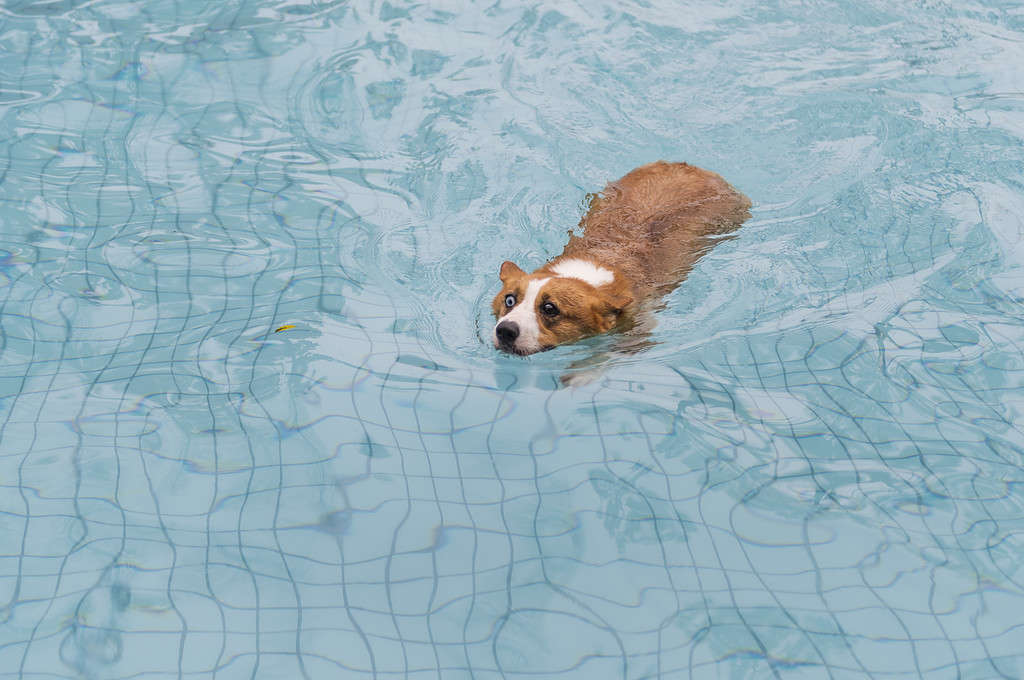
Corgis can swim, but they need careful supervision.
©chendongshan/iStock via Getty Images
Because swimming is difficult for corgis due to their short legs and rounded chests, you must carefully watch them when they are in the water. They may tire quickly with this unnatural task and need assistance escaping the water. Always have a plan in place when your corgi requires your help. Know where the nearest emergency veterinary hospital is, too, just in case you need to get there in a hurry.
One study compared the swim speed of a corgi named Elvis to a Labrador. The results showed both had similar times to retrieve a ball, but the corgi chose the shortest path. However, this doesn’t mean all corgis can swim quickly or well.
#2 Get Your Corgi a Life Jacket for Safer Swimming
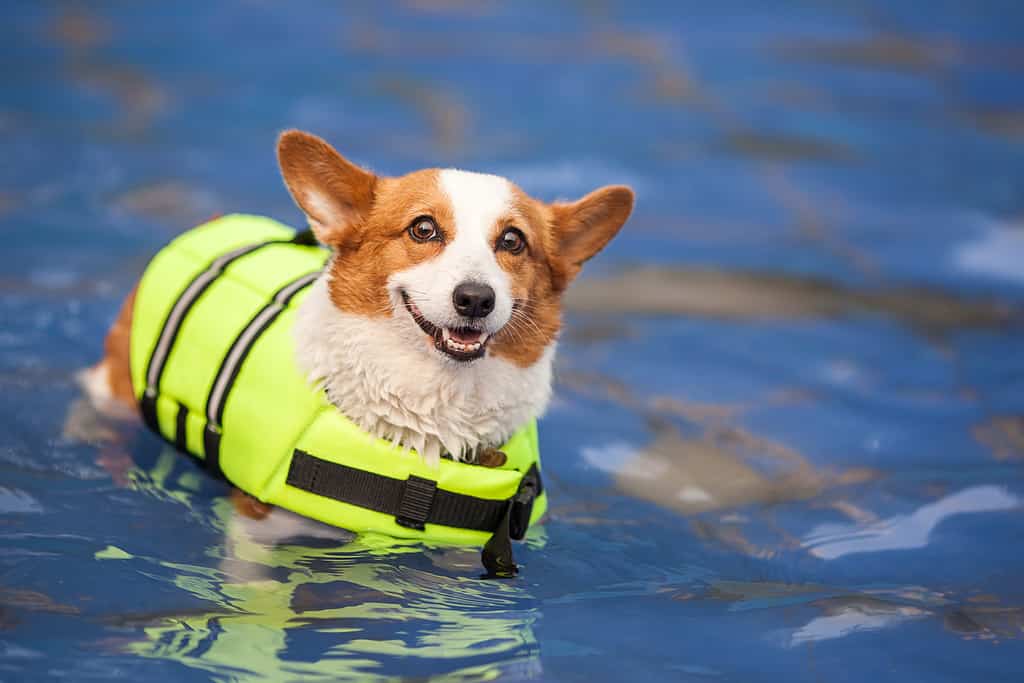
Wearing a properly fitting dog life jacket ranks high on the precautions to take when your corgi swims.
©MOAimages/iStock via Getty Images
If you plan to take your corgi on fun outdoor adventures such as kayaking or beach visits, ensure they’re adequately equipped with a life jacket. Life jackets for dogs are widely available both in stores and online. Be sure to ask for help if you’re concerned about the jacket’s fit. It should fit snugly, with only two fingers’ space between your dog’s body and the straps or armholes. If ordering online, be sure to measure your dog’s girth before ordering. This is the measurement just behind the shoulders all the way around the chest. This is usually the deepest part of your dog, requiring the most fabric for a good fit. You should choose a life jacket with designated lift straps, as well, in case you need to pull your corgi from the water.
#3 Corgis Should Swim in Shallow Water Only
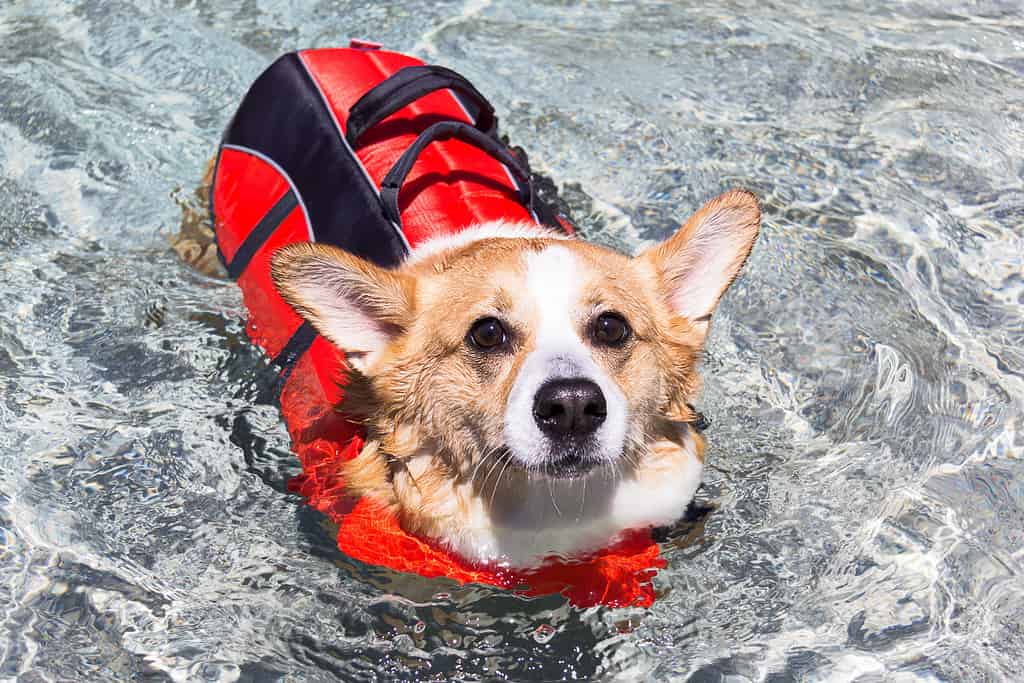
When your corgi needs to learn to swim, you must start with shallow water so they can easily stand up and breathe.
©mdesigner125/iStock via Getty Images
Unless your corgi has been swimming confidently for a while, always select areas with shallow water. Your dog should be able to easily stand up in the water on all four legs without their head becoming submerged. This will give you peace of mind that your corgi can stand up and breathe easily, even if they become exhausted while swimming.
#4 Make Sure Your Corgi Has an Escape Route
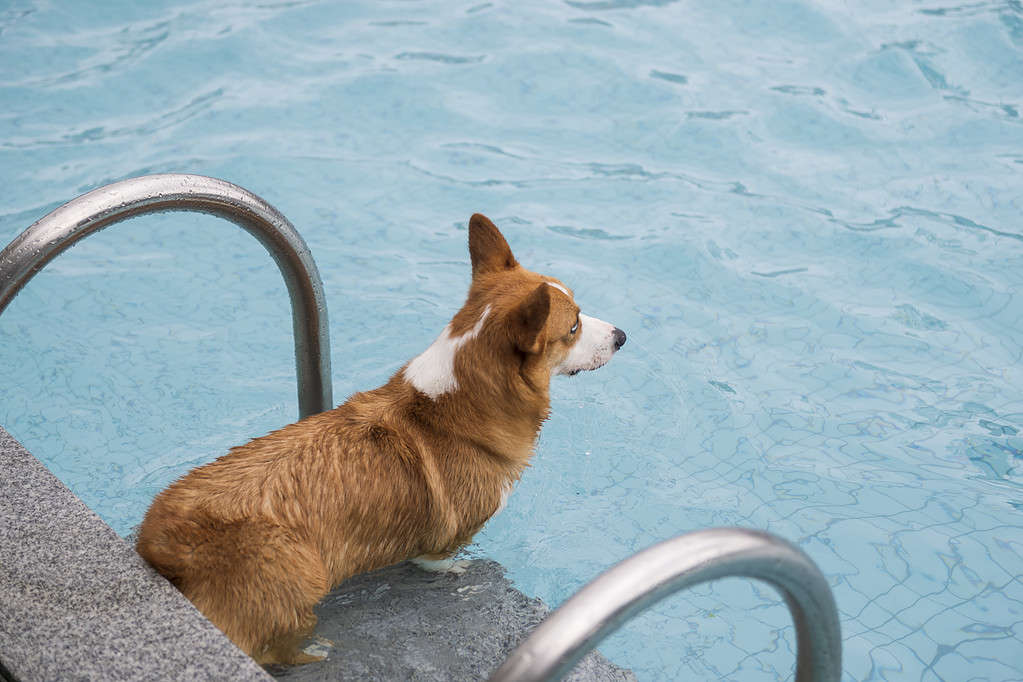
Your corgi needs an escape route, such as the pool stairs, so they can easily leave the water.
©chendongshan/iStock via Getty Images
It’s essential to have an easy escape route to get out of the water, whether it’s climbing stairs in the shallow end of the pool or a piece of plywood at the side of the lake. Giving your corgi this escape route is essential to safe swimming.
#5 Introduce Your Corgi to Swimming Slowly
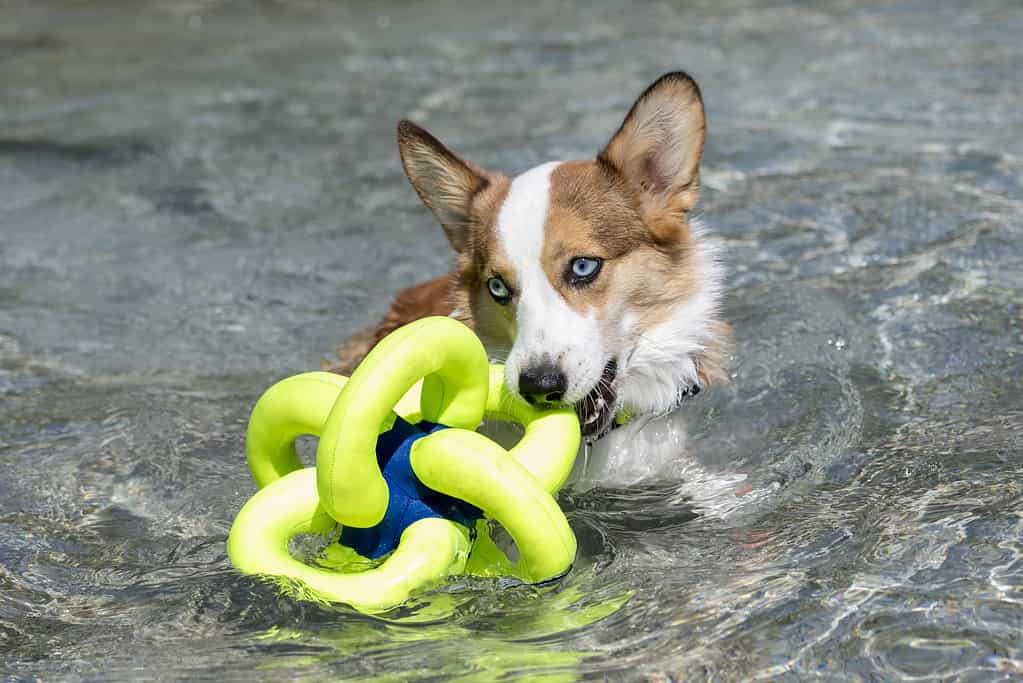
Using a toy to encourage your Corgi to swim is a great way to get them to enjoy the water.
©GoDogPhoto/iStock via Getty Images
Generally, corgis aren’t natural swimmers. Many refuse to enter the water or become very anxious when made to do so. By making a slow introduction to swimming, you can increase your corgi’s confidence in the water. Start using a small plastic pool with just a bit of water. Make it fun! Throw a ball or favorite toy into the pool and encourage your dog to fetch it. If that doesn’t work, try sitting in the pool and asking your corgi to come hang out with you. Remember, if your corgi isn’t having fun or becomes extremely upset, swimming might not be for them.
#6 Be Wary of Potential Infections

Take your pup to the vet if they show signs of ear or eye infections after swimming.
©Andrii Medvednikov/Shutterstock.com
Sometimes, water can be a source of eye and ear infections. When your corgi is done swimming, it’s best to bathe them immediately to remove chemicals, bacteria, or other potentially hazardous material. Rinsing the eyes gently with sterile saline and the ears with a drying solution made for dogs will help keep these body parts healthy.
Signs of eye infections include excessive watering, yellow/brown/green discharge, and pawing at the eyes. Ear infections can cause redness and swelling inside the ears and on the ear flaps, along with repeated head shaking and pawing at the ears. Also, watch for signs of skin infections such as redness, itchiness, peeling or broken skin.
#7 Hypothermia Can Affect Dogs Too

When in cold water, corgis need long breaks and rest between their swim sessions.
©BONDART/iStock via Getty Images
Hypothermia begins when a dog’s body temperature decreases below 99° Fahrenheit. Frostbite can become an issue along with cardiac and respiratory failure, brain damage, coma, and even death. If your corgi swims in cold water, make them take long breaks and allow them to dry completely in between dips. Hypothermia also leads to exhaustion and can result in drowning.
#8 Inhaling and/or Drinking Too Much Water
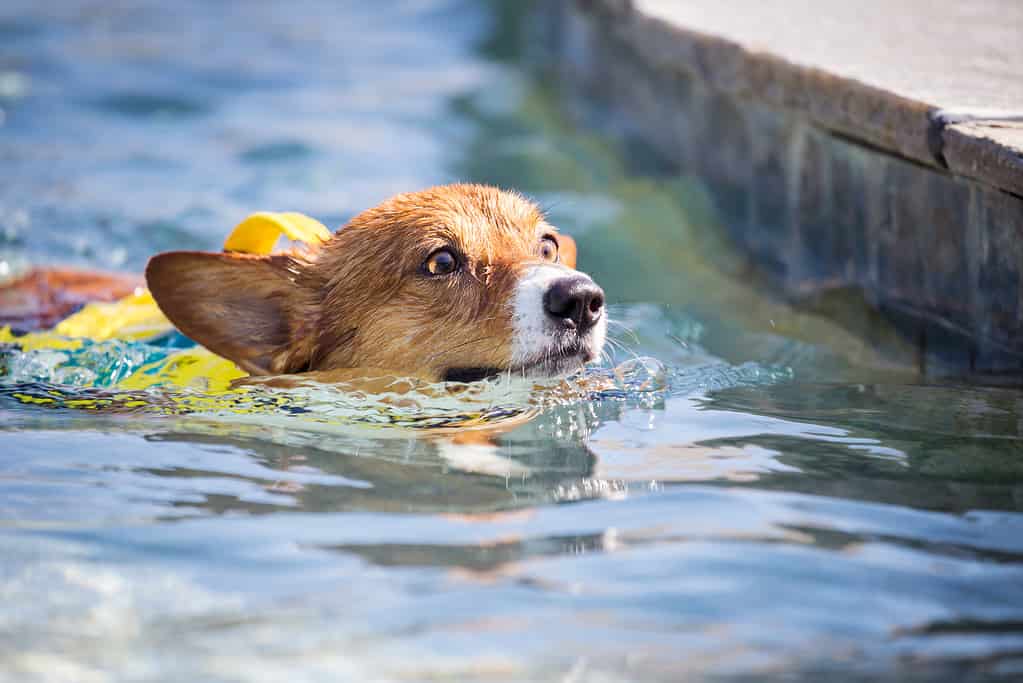
You should observe your corgi and make sure they don’t breathe water into their lungs.
©mdesigner125/iStock via Getty Images
When corgis swim, they may accidentally breathe water into their lungs. This is called aspiration and can lead to pneumonia. Pneumonia can be deadly without swift and proper treatment by a Doctor of Veterinary Medicine. Another problem, especially with ocean water, is your corgi drinking too much while they swim. Consuming salt water leads more quickly to dehydration and can cause significant stomach upset. If your corgi constantly wants to drink water while swimming, you may need to limit their time in the water significantly.
#9 Check for Potential Water Hazards Before Your Corgi Swims

Fast currents, sharp rocks, and fallen logs create potential hazards for your corgi while swimming.
©Wirestock Creators/Shutterstock.com
Water hazards include sharp rocks, fallen logs, and fast currents, among others. These items could injure pets while they swim. Make sure to check your corgi from nose to tail after swimming. Look for cuts or scrapes, biting animals (such as ticks or leeches), and other wounds.
Also, be very careful around waters known to contain dangerous animals such as snakes, snapping turtles, alligators, and sharks. Your corgi could quickly become a quick meal if you don’t check the area before letting them swim. It’s best to avoid areas with these types of dangerous wildlife.
#10 Provide Plenty of Fresh Water and Shade

Your corgi needs rest and water breaks in between swimming to minimize fatigue.
©iStock.com/Ирина Мещерякова
Making your corgi take breaks from swimming to hang in the shade and drink fresh water is essential. Because they can quickly become fatigued, they must rest before jumping back in. If you see any signs of distress, remove your pet from the water immediately and seek veterinary medical attention.
The photo featured at the top of this post is © mdesigner125/iStock via Getty Images
Ready to discover the top 10 cutest dog breeds in the entire world?
How about the fastest dogs, the largest dogs and those that are -- quite frankly -- just the kindest dogs on the planet? Each day, AZ Animals sends out lists just like this to our thousands of email subscribers. And the best part? It's FREE. Join today by entering your email below.
Thank you for reading! Have some feedback for us? Contact the AZ Animals editorial team.







